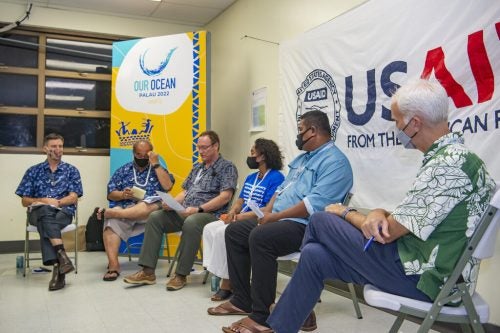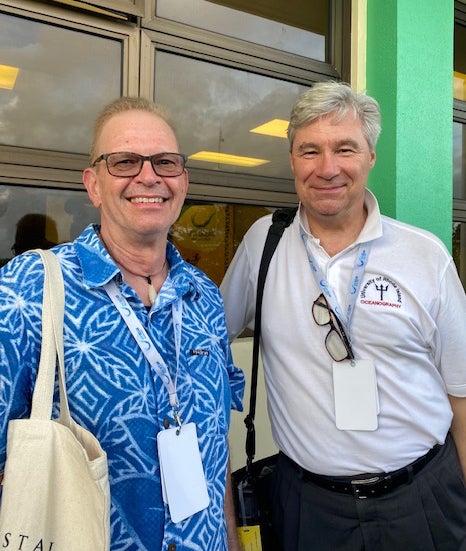June 8, 2022
The University of Rhode Island’s Coastal Resources Center in the Graduate School of Oceanography and its partners have been awarded a $15 million grant to address the social and ecological drivers of illegal, unreported and unregulated fishing in the Pacific Islands region.
The five-year cooperative agreement, awarded by the U.S. Agency for International Development, will support the Coastal Resources Center and other URI researchers to work with local partners across six island countries: the Federated States of Micronesia, the Republic of the Marshall Islands, Palau, Papua New Guinea, Solomon Islands and Vanuatu. The primary office for the project will be in Fiji. Pacific Island communities face critical challenges related to overfishing and climate change, and the project team will work with coastal communities to strive for sustainability.
The OurFish OurFuture program will address four strategic areas:
- Improvements in sustainable coastal fisheries management;
- Enhanced monitoring, control and surveillance in coastal fisheries;
- Private sector partnerships to promote sustainable supply chains;
- Strengthened resilience and meaningful engagement of marginalized actors in coastal fisheries management.

“This grant leverages the expertise at URI to approach the global challenges of climate change, fishery and supply chain sustainability, and coastal resiliency,” URI President Marc Parlange said. “Through this partnership, URI can support blue economy activity locally and internationally by helping to foster an active and engaged community in the Pacific Islands that is skilled in coastal ecosystem and fisheries management.”
The principal investigator is Peter Freeman, URI marine research associate and the co-principal investigators are Elin Torell, director of International Programs at the Coastal Resources Center, and Whitley Saumweber, visiting professor of Marine Affairs. Workshops with the partners started in the fall.
“The Coastal Resources Center has had great success in building strong local partnerships,” Torell said. “We reached out to the partners to develop this project so they could make it their own. The project covers a vast area with hundreds of small island communities.”
Among the key goals are greater community, gender and youth engagement in activity design, implementation and monitoring and mobilization of and enhancements to the growth of a blue economy in the Pacific Islands region.
Additional goals are:
- Improved enabling conditions and nested governance for ecosystem approaches to coastal fisheries management in Melanesia and Micronesia;
- Informed coastal ecosystem management and reduced illegal, unreported and unregulated fishing that improves the sovereignty, security, and sustainability across the two subregions;
- Factoring in shocks and stresses, and increasing the resilience of coastal ecosystems and fisheries-based livelihoods.
The OurFish OurFuture team is a partnership of URI’s Coastal Resources Center, the Locally Managed Marine Area Network, World Wildlife Fund and the University of the South Pacific. The program will also collaborate closely with the Pacific Community, other regional fishery organizations, non-governmental organizations and civil society organizations, and other government authorities.
The new project follows a $25 million project awarded to URI’s Coastal Resources Center by USAID in 2018 to assist sustainable fisheries efforts in the Philippines, an island country of 100 million people. Called FishRight, that program is also focused on partnerships that build sustainable fisheries, protect marine ecosystems and empower coastal communities. With an additional $3 million in funding, it is the largest single award in URI’s history.
The new $15 million OurFish OurFuture Program will integrate traditional management approaches and culture, science for management, Pacific regionalism, private sector partnerships and appropriate technology to foster substantial changes in social and ecological aspects of coastal fisheries management in Micronesia and Melanesia.
Such an approach is central to protecting the individual community fishermen and the health of the fisheries while working together with the industrial fishing interests.
“Our goal is to connect the regional and industrial fishing interests with local communities to help develop local management of the fisheries,” Torell said. “It has been a successful model in other places.
“For many in these small communities, it’s a question of if you don’t fish, what do you do in terms of nourishment and support for your families?”
Torell said climate adaptation and even the impact of COVID-19 on the economic system and fisheries are going to be addressed as part of the award.
“We help people prepare for the environmental shocks, but COVID-19 has also been a shock to the system,” Torell said. “When we build resilience, it can help alleviate a variety of problems.”
Before and throughout the pandemic, the Coastal Resources Center has had partners in all of the participating countries. “This has given our local partners the chance to take on leadership roles,” she said.

